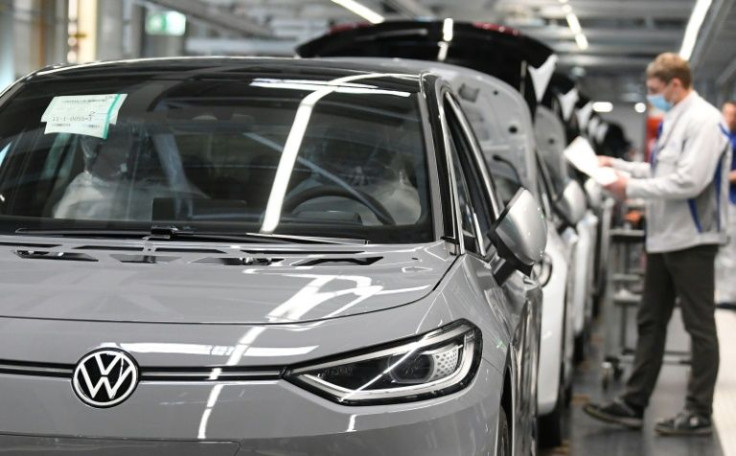German Economy Struggles Through Virus And Supply Issues
Germany's economy grew modestly last year, likely shrinking in the final months as the coronavirus pandemic and supply chain issues held back Europe's industrial powerhouse, official data showed Friday.
The 2.7 percent growth figure likely leaves Germany as a European laggard in the recovery from the economic shock of the pandemic.
Growth across the European Union is expected to have been around five percent in 2021, according to the latest predictions by the European Commission, with France and Italy surging ahead.
Germany's modest rebound was achieved "despite the continuing pandemic situation, more delivery bottlenecks and material shortages," the head of the federal statistics agency Georg Thiel said in a statement.
"The German economy managed to recover from the sharp fall last year although the economic performance has not yet reached its pre-crisis level again," Thiel said.
In 2020, on a price and calendar adjusted basis, Germany's gross domestic product (GDP) plunged by 4.9 percent as the coronavirus forced large parts of Europe's biggest economy to shut down.
"The very high expectations placed in the German economy at the beginning of 2021 were only partially fulfilled," said Fritzi Koehler-Geib, chief economist at German public lender KfW.
Early predictions for 2021 tabled growth estimates upwards of four percent. Those forecasts were progressively revised down as industry was hampered by bottlenecks and new health restrictions.
With prices for energy soaring to multi-year highs too, the economy likely shrank by "between 0.5 and one percent" in the fourth quarter of 2021, Destatis said.
"The economic development was highly dependent on Covid-19 infection rates and the associated preventive measures also in 2021," Thiel said.

The pandemic was also at the root of upheaval in global supply chains, leading to shortages of raw materials and components that have hampered industry month after month.
German manufacturers, with their vast web of suppliers and reliance on exports, have been particularly hard hit by the widespread shortages.
The country's flagship carmakers were forced to interrupt production at their factories to manage a shortage of chips, a key component in both conventional and electric vehicles.
A total of 2.62 million cars were sold in Germany last year, according to the federal transport authority, 10.1 percent lower than in 2020, a year in which the industry had already seen numbers plummet due to the pandemic.
"The outlook for economic growth is generally favourable, but the risks are high, especially in the short term," Koehler-Geib said.
"As in 2021, there is the threat of an economic rollercoaster ride over the peaks and valleys of new Corona waves," she added.
The sluggish performance is a concern for Chancellor Olaf Scholz's new government and its plans to boost the economy with climate investments.
In 2021, the government pumped in huge amounts of cash to cushion the pandemic blow, providing a "support for growth" for the second year of the health crisis, according to Destatis.
Nonetheless, Germany created 24.8 billion euros ($28.4 billion) less debt than first planned, Finance Minister Christian Lindner told parliament on Friday, and is setting aside 60 billion euros to invest in its net zero and digital transformation.
In doing so the government was "reserving unused opportunities from last year" to invest in "growth drivers like climate protection", Lindner said.
© Copyright AFP 2024. All rights reserved.











